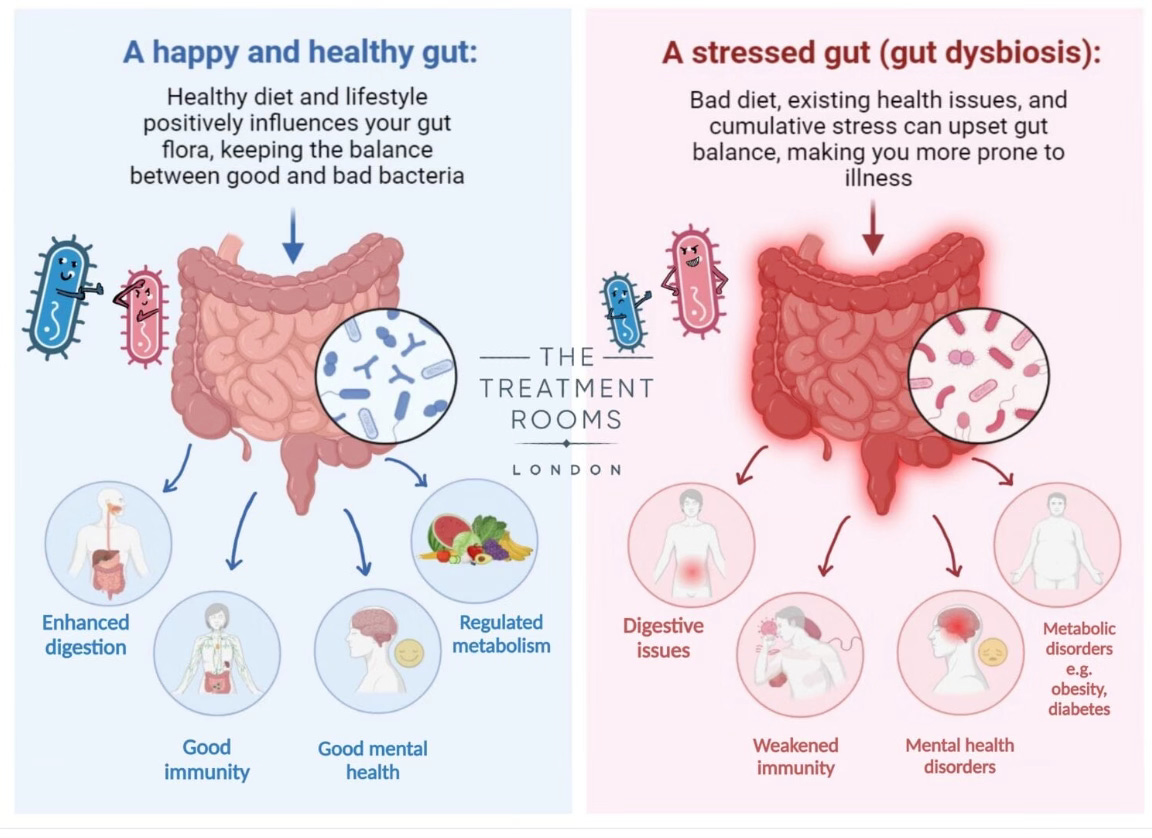Your microbiome through the ages – and three startups working to support it
Your microbiome is critical in your overall health, but did you know that the needs of your gut are unique to you and evolve over your lifetime?
TL;DR
Your microbiome has impacts on your health, across digestion, weight management, immunity, and mental health, but also evolves over time.
While your microbiome health starts with your everyday habits (diet, exercise, sleep, water, etc), there are a range of supplements you can take to boost your microbiome based on where you have deficiencies.
You should be paying extra attention to your gut and pursuing tailored products during a few key changes in your life. For example, Persephone Biosciences addresses the 90% of infants that are born with microbiome deficiencies today, Supergut provides functional shakes and bars that help boost your metabolism in a way similar to GLP-1, and Biohm helps identify your unique microbiome profile to help you navigate the stresses of adulthood. If you are working at an early stage startup in this space, we want to hear from you!
When we think about our unique identity, we often consider fingerprints or DNA as the ultimate markers of who we are. However, another distinct identifier is our microbiome. The microbiome, especially the gut microbiome, is so tailored to each person that it can be likened to a second fingerprint. But, unlike a fingerprint, the microbiome evolves with us. Learning more about the microbiome and the products that support it will unlock health gains at every stage of life
What is the gut microbiome?
Gut health refers to the balance and function of the trillions of microorganisms living in the digestive tract. These microorganisms, collectively known as the gut microbiome, include bacteria, viruses, fungi, and other microscopic entities.
The good microorganisms in the gut help with digestion, nutrient absorption, waste elimination and immune function, while also protecting against harmful pathogens. The gut lining acts as a barrier that controls what gets absorbed into the bloodstream, maintaining the body's internal balance and preventing inflammation.
Why should I keep my microbiome healthy?
Source: The Treatment Rooms London
Digestion and weight management
A well-functioning gut is essential for digesting food and absorbing nutrients, and influences metabolism and can affect weight management. Research has shown that people with a diverse gut microbiome tend to have a healthier weight, while imbalances have been linked to obesity. This suggests that maintaining a healthy gut can aid in weight control and reduce the risk of metabolic disorders like diabetes.
220 million Americans face digestive issues today, the most direct consequence of poor gut health. Conditions like irritable bowel syndrome (IBS), inflammatory bowel disease (IBD), and even food intolerances are often linked to imbalances in the gut microbiome. Symptoms such as bloating, gas, diarrhea, and constipation can significantly impact daily life.
Immunity
Gut health also plays a pivotal role in the immune system. Approximately 70-80% of the body's immune cells are located in the gut, where they interact with gut microorganisms. A healthy gut microbiome helps regulate the immune system, protecting against infections, reducing inflammation, and preventing autoimmune diseases.
Mental health
Source: Livaux Twitter
Why do you feel a knot in your midsection when you’re nervous? The brain-gut axis is a bidirectional communication pathway between the nervous and digestive systems, connected by neurons that line the GI tract (also known as the “second brain” in your gut) and other compounds.
The gut microbiome produces and regulates neurotransmitters like serotonin and dopamine, which are essential for mood regulation. An imbalance can disrupt this process, leading to mood disorders. Researchers have found correlations between the gut and a range of mental health conditions, including stress, depression, mood.
How can I improve my gut health?
Source: Creadev
A healthy gut starts with a diet composed of diverse, whole foods, plenty of water, and an overall healthy lifestyle that balances exercise, sleep, and more. However, there are a few common types of supplements that can enhance the health of your microbiome: probiotics, prebiotics, postbiotics, synbiotics, and digestive enzymes.
Probiotics are live microorganisms naturally found in fermented foods like kefir, kimchi, kombucha, and sauerkraut. These supplements boost the level of beneficial microorganisms in your gut, supporting digestion, improving nutrient absorption, and strengthening the immune system. By outcompeting harmful pathogens, probiotics promote a healthier gut environment, leading to better digestion and overall well-being.
Prebiotics are non-digestible fibers that act as food for probiotics. They are found in a variety of foods including asparagus, beans, chicory, and whole grains. Eating prebiotics promotes the growth and activity of beneficial gut microorganisms.
Postbiotics are beneficial compounds produced by probiotics during fermentation, including vitamins and short-chain fatty acids, that directly support gut health. They foster a healthy gut environment to help good microorganisms thrive. This creates a virtuous cycle where postbiotics and probiotics work together to improve digestion and strengthen the immune system.
Synbiotics are a combination of probiotics and prebiotics. They are designed to promote the survival and activity of beneficial gut microorganisms, and have been shown to alleviate symptoms of IBS, reduce inflammation, and promote overall gut health and immunity.
Digestive Enzymes, or food enzymes, are supplements that aid in the digestion of food. They help break down food into nutrients that our bodies can absorb.
When should I pay attention to my gut microbiome?
Unlike a fingerprint, your gut microbiome naturally changes as we age. While it is always crucial for good health, there are a few key stages of your life where you should tune in to understand what your gut may need.
Infancy and Early Childhood: 90% of babies globally are born with microbiome deficiencies today. Factors such as birth method (vaginal delivery vs. C-section), breastfeeding, and early exposure to antibiotics can significantly influence the development of the gut microbiome. Persephone Biosciences is a pioneer in the infant probiotic space. Persephone offers a scientifically-backed daily synbiotic containing proprietary probiotics and a blend of human milk oligosaccharides, backed by the MyBabyBiome clinical study, the largest and most diverse US study on infant microbiomes.
‘From infancy, where the foundation of gut health is laid, to adulthood and aging, where specific interventions can support digestion, immunity, and cognitive health, it’s critical that we tailor microbiome strategies to individual needs at each phase of life. That’s been the focus of our research and product pipeline at Persephone.’
- Stephanie Culler, Persephone Biosciences CEO
Adolescence: Adolescents have a distinct microbiome profile from both children and adults. The microbiome can influence hormone regulation, and imbalances may contribute to issues such as acne or mood swings. Maintaining a balanced diet rich in fiber, fruits, and vegetables is crucial during this period. Recent research has shown that a diet rich in complex carbohydrates and protein, in particular plant-based protein, may help reduce the risk of early onset of puberty in girls through gut microbiota-metabolite interactions.
Adulthood: Stress, poor diet, lack of sleep, and the use of medications like antibiotics can disrupt the gut microbiome. Paying attention to diet, managing stress, and possibly incorporating probiotics or fermented foods can help maintain gut health in adulthood as your body continues to age.
BIOHM is leveraging the power of AI and its unique bioinformatics dataset, both bacterial and fungal, to discover innovative ingredients and formulations, specifically tailored to cohorts selected from its data. AI allows to better understand relationships between organisms and create stronger hypotheses around mechanisms of action for specific cohorts. BIOHM is now partnering with ingredient companies and consumer brands to drive innovation by introducing cutting-edge ingredients and formulations to the market.
‘At BIOHM, we believe the microbiome is the foundation of human wellness’.
- Sam Schatz, BIOHM CEO
Lifestyle Changes: As discussed, gut health plays a key role in weight loss and metabolism. Depending on the goals of your lifestyle changes (including diet, muscle gain, and weight loss), you may want to tailor your gut health approach to ensure optimal results. Supergut is the first-of-its kind nutrition brand that offers a line of powders, shakes, and bars that fortify gut health, curb food cravings, and keeps blood sugar stable. Backed by a proprietary prebiotic blend that targets the same GLP-1 hormones as popular drugs like Ozempic, Supergut has published a 12-week, double-blinded clinical study which shows consistent consumption of their prebiotic shakes leads to both metabolic and quality of life improvement.
Aging: In older adults, gut health is vital for preventing chronic diseases and maintaining cognitive function. The diversity of the gut microbiome actually tends to increase with certain strains of bacteria found concentrated in those over 100 years of age. A diet rich in fiber, regular physical activity, and staying socially active can support gut health in the senior years. Researchers in recent years have been exploring targeted treatment to restore microbial strains associated with healthy aging.
Our takeaways
Your gut microbiome is more than just a collection of microorganisms; it's a unique and integral part of your identity and health. By understanding what gut health is, why it's important, and how it affects you, you can take proactive steps to maintain a healthy gut throughout your life. From infancy to old age, paying attention to your gut health can lead to better digestion, stronger immunity, and improved mental well-being.
Resources to learn more
Contact us
By: Christina Li, Alexia Lingart, Jacob Afriat, Joel Filippi, Heloise Mangin, and Renee Wurth, PhD
Please reach out to us if you’re working at a startup or investing in this space and want to chat more!
Great Circle Ventures: Great Circle Ventures is an early-stage venture capital fund that invests at the intersection of food, human health, and planetary health. We invest in companies that address the food ecosystem transformation and the transition to a climate smart and healthy food system.
Creadev: Launched in 2002, Creadev is an evergreen investment company operating worldwide, supporting companies able to scale-up and become global best players in their sector. We forge long-term partnerships with passionate, innovative entrepreneurs dedicated to expanding access to essential goods and services in Food, Healthcare, and Climate. Backed by the Mulliez family, we leverage their global network and entrepreneurial spirit to accelerate growth.








